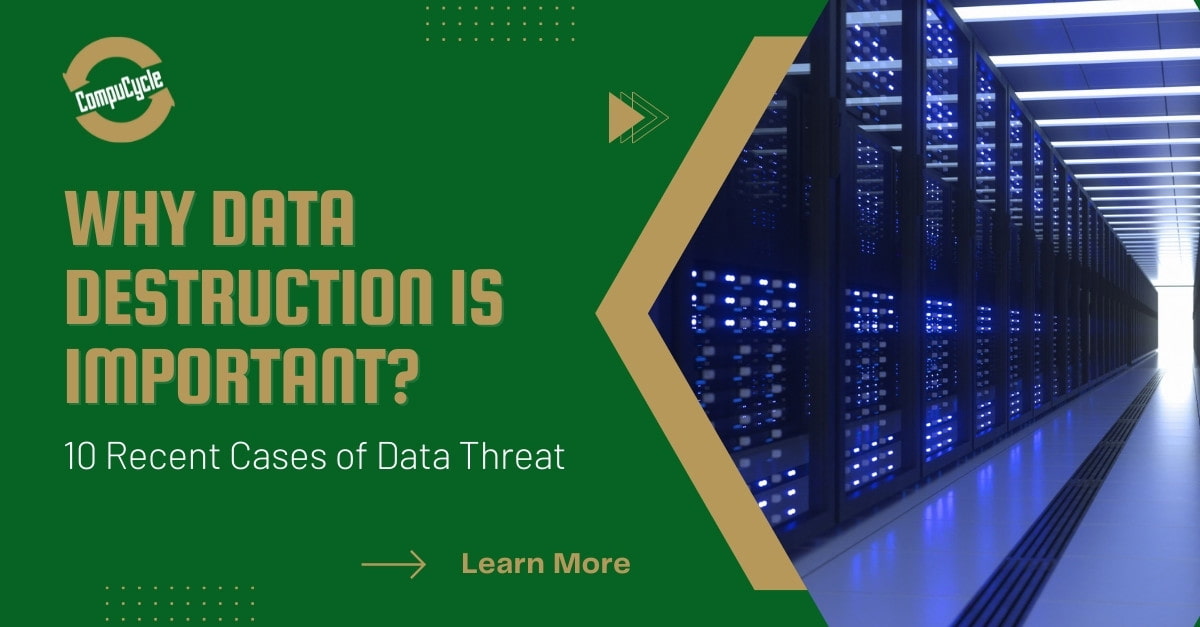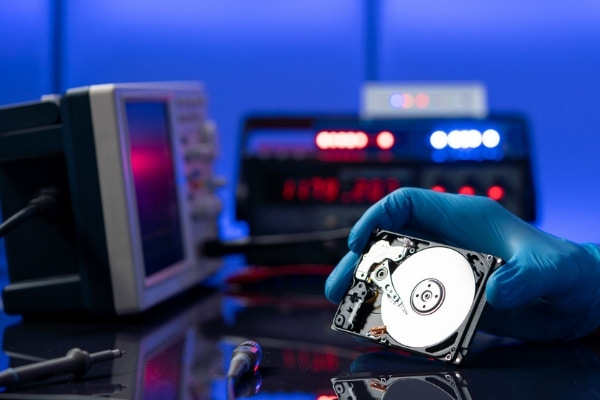
Cybercrimes and data breaches have been increasing at an unprecedented pace for the last few years. Companies have been losing millions of dollars, and their reputation has crumbled to the ground only because they were not careful enough with matters related to their cybersecurity. Secure hard drive disposal is a great remedy to this problem as businesses can mitigate several high-level cyber threats by ensuring absolute data destruction.

What is Data Destruction?
When most people think of data destruction, they likely envision a scene from a movie where a person takes a sledgehammer to a computer. However, while this might make for good entertainment, it is not an effective way to destroy data.
There are many ways to destroy data, such as deleting the files through standard deletion methods or standard formatting with the help of special software, or the physical destruction of the storage device. When properly done, this method makes the data on the device unrecoverable.
Why is Data Destruction Important?
Data Destruction is important for many reasons. First, when data is destroyed, it can no longer be accessed or used by anyone. This protects the privacy of businesses and their customers alike. Second, destroying data prevents it from being stolen or leaked. This is especially important for confidential or sensitive information. Finally, data destruction ensures that no one can salvage any useful information from discarded devices or drives.
When a company ensures proper electronic data destruction, all its business secrets and financial information remain safe from unauthorized access. A business that does not ensure absolute shredding risks losing customer trust, financial losses, ruined business reputation, and facing regulatory fines.
Recent Cases of Data Threats and Breaches
#1. In September 2018, Equifax, one of the three largest credit reporting agencies in the United States, announced a data breach that exposed the personal information of over 147 million people.
#2. In April 2018, Facebook acknowledged that the personal data of up to 87 million users might have been improperly accessed by Cambridge Analytica, a political consulting firm.
#3. In February 2018, Yahoo! disclosed that all 3 billion of its user accounts were affected by a data breach that occurred in 2013.
#4. Uber announced that it suffered a data breach affecting 57 million users. The company paid hackers $100,000 to destroy the data they had stolen.
#5. A data breach at Deloitte, one of the world’s largest accounting and professional services firms, exposed the confidential information of an unknown number of clients.
#6. Equifax announced that it suffered a data breach affecting 143 million people.
#7. A data breach at Saks Fifth Avenue, Lord & Taylor, and other retailers owned by Hudson’s Bay Company exposed the personal information of over five million people.
#8. A data breach at Experian, one of the three largest credit reporting agencies in the United States, exposed the personal information of 15 million people.
#9. A data breach at the U.S. Department of Energy exposed the personal information of over 100,000 people.
#10. A data breach at Wendy’s exposed the personal information of over 1,000 people.
These are just a few of the most recent cases of a data breach. As we can see, no one is immune to data threats – not even large companies with extensive security measures in place. While there is no guaranteed way to prevent a data breach from occurring, there are steps that organizations can take to minimize the risk, such as encrypting sensitive data and implementing secure electronic shredding.
How to Mitigate Data Threats
Now that you know what data destruction is and why data destruction is important, let us look at how you can ensure the mitigation of cyber threats. Businesses and organizations can render their sensitive data safe by partnering with certified secure hard drive disposal companies, like CompuCycle, to ensure absolute data destruction.
CompuCycle is an industry-leading electronic data destruction company that uses department of defense approved software which wipes hard drives using the latest most secure techniques. CompuCycle also has a state-of-the-art mobile hard drive shredder that can be brought to your facility to provide an on-site hard drive shredding service for added safety and security of your data.
As an R2 certified IT recycler, CompuCycle can provide certificates of destruction to its clients as well as serialized inventory reports tying hard drives and other IT assets to parent machines. CompuCycle uses industry-leading data sanitization tools, is R2 certified, and follows the latest local and international regulations across all processes.
To ensure your company’s future data security and reputation, get in touch with CompuCycle today!
Recent Articles
Secure Electronics Disposal in Houston: Why the City’s Largest Industries Trust CompuCycle
When a major healthcare system decommissions thousands of laptops, or an oil and gas company retires an entire data center, one question comes up again and again: What happens to all that data — and…
Read MoreCompuCycle Executives Join R2 TAC and e-Stewards Leadership Council to Advance ITAD Standards
Houston-based ITAD provider deepens its industry influence through active participation in standard-setting committees. As corporate ITAD needs evolve alongside stricter compliance and ESG requirements, CompuCycle continues to lead the way—this time by contributing directly to…
Read MoreI’m Just a Computer: A Journey Through ITAD Recycling
Meet Chip the Computer – he’s about to take you on an unforgettable journey through the world of IT Asset Disposition (ITAD). Buckle up for an adventure that’s both educational and entertaining! Chapter 1: “Hello,…
Read MoreIs There a Wrong Way to Recycle Electronics?
Most people agree that recycling electronics is the right thing to do. It prevents hazardous waste from entering landfills, supports sustainability goals, and allows for the recovery of valuable materials. But what many businesses don’t…
Read MoreHow ITAD Can Offset Enterprise IT Costs: The CIO’s Guide
CompuCycle’s R2v3 Dual Certification Ensures Secure Data Destruction and Eco-Friendly Recycling
Women in Leadership: Kelly Adels Hess on Mentorship and Sustainability on Sean Barnes’ Podcast, The Way Of The Wolf
- « Previous
- 1
- 2
- 3



